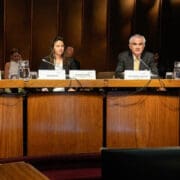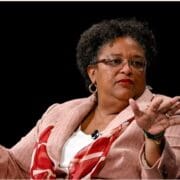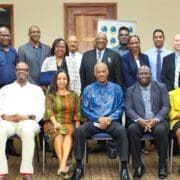Black Immigrant Daily News
The earthquake that struck T?rkiye and Syria is one of the biggest natural disasters in our times.
Just hours ago, the first United Nations convoy crossed into northern Syria through the Bab al-Hawa crossing. It included 6 trucks carrying shelter and other desperately needed relief supplies.
More help is on the way, but much more, much more is needed.
We have all seen the heart-wrenching images and the heroic efforts of humanitarians battling the elements, the clock and the odds to save lives.
We mourn the loss of so many – and the tragic toll keeps growing.
Thousands of buildings have collapsed.
Tens of thousands of people are exposed to unforgiving winter conditions.
Schools and hospitals have been destroyed.
Children are enduring terrible trauma.
And we are sadly aware that we haven’t yet seen the full extent of the damage and of the humanitarian crisis unfolding before our eyes.
When I see the images, I see people and places I know well.
This has long been a region of support for refugees and displaced people.
As High Commissioner for Refugees, I traveled to the area many times.
I will never forget those visits.
T?rkiye is home to the largest number of refugees in the world and has shown unparalleled generosity to its Syrian neighbors.
Indeed, up to 3.6 million Syrians have lived in T?rkiye for more than a decade. Many of them are now victims of the earthquake
I also have been to Aleppo and met Syrians who warmly welcomed Iraqi refugees fleeing violence and war – integrating them into their society. There was more than one million Iraqi refugees in Syria. They were not in camps. They were received by the communities and integrated into community life in enormous generosity.
On my visits, I was deeply moved by the solidarity of people who opened their homes and their hearts.
Now those homes have been destroyed and those hearts are breaking.
A centre of solidarity is now an epicentre of suffering.
People are facing nightmare on top of nightmare.
The earthquake struck as the humanitarian crisis in northwest Syria was already worsening, with needs at their highest level since the conflict began.
The United Nations has done its best to race to respond.
We are deploying disaster assessment experts; coordinating search and rescue teams; providing emergency relief, food, medical supplies, thermal blankets and other life-saving items.
And we are committed to doing much more.
That is why I have asked Under-Secretary-General for Humanitarian Affairs and Emergency Relief Coordinator Martin Griffiths to travel to areas affected by the earthquake this weekend.
He is already in T?rkiye. He will visit Gaziantep, Aleppo and Damascus to assess needs and see how we can best step up our support.
To provide this assistance, we will need two things:
First, access.
Roads are damaged.
People are dying.
Now is the time to explore all possible avenues to get aid and personnel into all affected areas.
We must put people first.
Second, resources.
The humanitarian response – the Syria humanitarian fund and the Syria cross-border fund – need an urgent injection of support.
They are the best options to enable the UN and its humanitarian partners to rapidly respond to people in need.
We have released $25 million from the UN’s Central Emergency Response Fund to jumpstart the response.
By early next week, we will launch a Flash Appeal for donor support for those affected by the earthquake in Syria.
As we speak, UN agencies – along with international and national NGOs are working on the Syria response – and assessing their initial funding requirements for the next three months.
These resources will be used by the humanitarian community for critical aid: shelter, health, nutrition, water, sanitation, hygiene, education, protection and psychosocial support services.
We are also ready to support the Turkish government’s response in any way we can.
In the face of this epic disaster, I strongly appeal to the international community to show the people of T?rkiye and Syria the same kind of support and generosity with which they received, protected and assisted millions of refugees and displaced people in an enormous show of solidarity.
Now is the hour to stand up for the people of T?rkiye and Syria.
Thank you.
Q: I have two questions: the first, do you think that there should be more border crossings opened, beside Bab el Hawa? And the second question, do you believe that the Security Council should issue a statement about the subject, should discuss the subject? Do you have any comments on that? Do you have any recommendations to them?
SG: This is the moment of unity, not to politicize or to divide, but it is obvious that we need massive support, and so I would be of course very happy if the Security Council could reach a consensus to allow for more crossings to be used, as we need also to increase our capacity to deliver on crossline operations into Idlib from Damascus.
Q: The Syrian Government, Secretary-General, is saying that all aid should go through Damascus and it all should be crossline. Do you think crossline is enough now?
SG: Crossline is very important; we should do everything we can in crossline, but disaster has such proportions that we need both crossline and cross-border to intensify all forms and my appeal is for this question not to be politicized and this is a moment in which we all must be together to support people in need. And people that, as I said, have been so generous when supporting others, as both Syrians and Turkish have been in the past with refugees from Syria in T?rkiye and from Iraq in Syria.
Q: Thank you. What do you see as the greatest obstacles to access right now, and have you asked the Syrian Government to allow more cross-border?
SG: Well, first of all, as I said, the first convoy already crossed, which means that we are moving. And as I said, many non-UN relief agencies are already delivering through other crossings, so this also needs to be taken into account. As I said, I would be very happy if in relation to the UN, there will be the possibility to do it also in as many crossings as possible.
Q: Secretary-General, do you think the unilateral coercive measures should be lifted in the wake of the earthquake to mobilize more resources? And what’s your… you have talked with the Syrian Permanent Representative here. What is his view on this earthquake?
SG: This is a moment in which everybody must make very clear that no sanctions of any kind interfere with relief to the population of Syria in the present moment.
Q: SG, are you disappointed in how slow it’s been getting aid in, and not all because of the earthquake but some of it because of government red tape?
SG: It’s not for me to criticize others, because in a moment like this, we all struggle to do our best. What I can tell you is that we are doing our best to be able to support everybody in it.
Q: Secretary-General, one more please. I saw stats from OCHA this morning that only five percent of reported sites in northwestern Syria are currently being covered by search and rescue teams. I wonder, with a statistic like that, what are the broader takeaways for the international community when you have a crisis like a manmade conflict like the war in Syria collide with mother nature’s fury – I wonder what that says about the prioritization that needs to happen in terms of the UN’s development agenda.
SG: My appeal to all the international efforts that have been made in relation to rescue and we have teams to do rescue in the region, my appeal is for them to be able to do their job both in T?rkiye and in Syria.
Donate At Caribbean News Service, we do not charge for our content and we want to keep it that way. We are seeking support from individuals and organisations so we can continue our work & develop CNS further.
NewsAmericasNow.com









